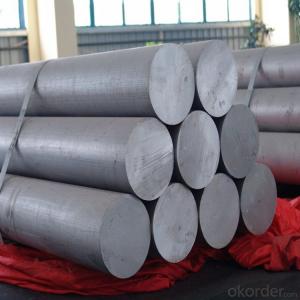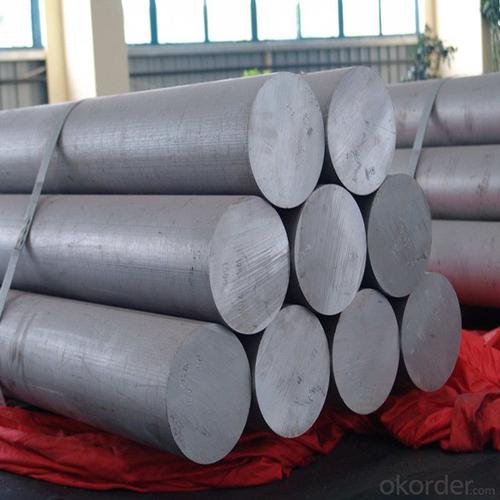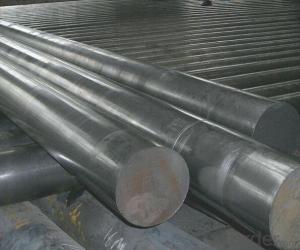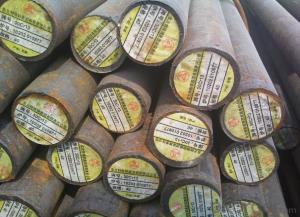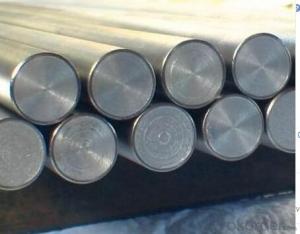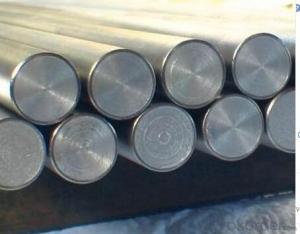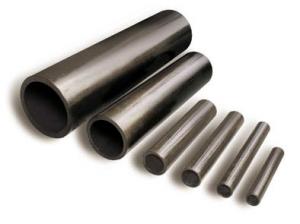high quality bearing steel, GCr15, 40Cr, SAE1055, G20CrNiMo
- Loading Port:
- China main port
- Payment Terms:
- TT OR LC
- Min Order Qty:
- 500 m.t.
- Supply Capability:
- 10000 m.t./month
OKorder Service Pledge
OKorder Financial Service
You Might Also Like
Specifications:
1) Grade: Bearing steel SAE 52100 / GCr15 round bars
2) Diameter: 20-500mm
3) Hot rolled/forged, annealed
Application:
Commom steel used to produce balls and rings of bearing. The product has characteristics of uniform-chemical composition, low percentage of harmful elements, high purity, well-distributed carbide, good surface quality. It also has characteristics of wide scope of plastic,stable heat-treatment quality, uniformand high hardness, high wear resistance,high strength of touching fatigue. It has excellent machining property afer spheroidize annealing.
The use of products The product is used to produce balls and rings of bearing. Future Development By rational rolling and cooling process, the product can be spheroidized on-line and can be used in drawing and machining directly by customers. By combining re-spheroidize annealing and re-crystallisation of semi-finished product, the steel wire process can be simplified.
Packaging & Delivery
Mark: Heat No. will be cold stamped and Steel grade, diameter (mm), length (mm), and the manufacturer LOGO and weight (kg) is painted.
Standard seaworthy packing or as customer required
Delivery time: Within 30 days after order is confirmed.
Benefits of Bearing Steels:
•Cleanliness and freedom from objectionable microscopic slag type inclusions.
•Shallow decarburized surface
•Dimensional accuracy and excellent micro-structure uniformity.
Our Advantages:
•Fast delivery
•Non-standard sizes and made-to-order
•Small min order quantity
•Economical Pricing
•Quality confirming to International Standards
•Material Test Certificates for Quality Assurance
•Technical Qualified After Sales
•Excellent Delivery Conditions.
- Q: How does special steel contribute to the renewable energy industry?
- Special steel plays a crucial role in the renewable energy industry by providing the necessary strength, durability, and resistance to extreme conditions for various applications. It is used in wind turbines, solar panels, and hydroelectric infrastructure, enabling the efficient and reliable generation of renewable energy. Special steel also helps enhance the performance, efficiency, and lifespan of these renewable energy systems, ultimately contributing to the sustainability and growth of the industry.
- Q: How is stainless tool steel used in the manufacturing of surgical instruments?
- Stainless tool steel is commonly used in the manufacturing of surgical instruments due to its exceptional properties such as corrosion resistance, durability, and high hardness. These qualities make it suitable for producing sharp, long-lasting cutting edges on surgical instruments like scalpels, forceps, scissors, and bone saws. The stainless tool steel ensures that the surgical instruments remain sterile, withstand repeated sterilization processes, and maintain their sharpness, thus maximizing their longevity and effectiveness in surgical procedures.
- Q: What are the challenges in forging special steel?
- Forging special steel poses several challenges, primarily due to its composition and properties. One challenge is achieving the desired microstructure and alloy distribution throughout the steel during the forging process. Special steels often contain complex alloys, which can be difficult to evenly distribute and maintain during forging. Another challenge is controlling the temperature and heat treatment processes to avoid any detrimental effects on the steel's mechanical properties. Special steels are sensitive to temperature changes, and improper heating or cooling can lead to structural weaknesses or loss of desired properties. Additionally, forging special steels may require specialized equipment and techniques to accommodate their unique characteristics, making the process more intricate and demanding.
- Q: How does special steel contribute to the aerospace racing industry?
- Special steel plays a crucial role in the aerospace racing industry by offering superior strength, durability, and performance characteristics that are essential for the demanding conditions and requirements of high-speed racing. One of the primary contributions of special steel to the aerospace racing industry is its ability to withstand extreme temperatures and pressures. Special steel alloys, such as nickel-based superalloys, are specifically designed to maintain their mechanical properties under high temperatures, making them ideal for the intense heat generated during racing. These alloys exhibit excellent creep resistance, allowing the components to withstand prolonged exposure to elevated temperatures without deformation or failure. Moreover, special steel alloys possess exceptional strength-to-weight ratios, providing a competitive advantage in the aerospace racing industry. The high strength of these alloys allows for the design and construction of lighter and more efficient racing components, such as engine parts, landing gears, and structural elements. This reduces the overall weight of the aircraft, enhancing its performance and speed while maintaining structural integrity and safety. Additionally, special steel offers excellent corrosion resistance, which is vital in the aerospace racing industry. The harsh conditions experienced during racing, including exposure to moisture, chemicals, and atmospheric elements, can lead to corrosion and deterioration of critical components. Special steel alloys, such as stainless steel, are highly resistant to corrosion, ensuring the longevity and reliability of the racing aircraft. Furthermore, special steel's unique metallurgical properties, such as high fatigue and fracture resistance, contribute to the safety and reliability of the aerospace racing industry. The high fatigue strength of these alloys allows them to withstand repeated loading and unloading cycles without developing cracks or failures. This is crucial in high-speed racing, where components are subjected to significant stress and strain. Special steel's exceptional fracture toughness also ensures that any potential cracks or flaws do not propagate catastrophically, minimizing the risk of catastrophic failures during racing. In conclusion, special steel plays a pivotal role in the aerospace racing industry by offering superior strength, durability, and performance characteristics. Its ability to withstand extreme temperatures, provide excellent strength-to-weight ratios, resist corrosion, and exhibit high fatigue and fracture resistance makes it an indispensable material for the construction of racing aircraft components. The use of special steel in the aerospace racing industry ultimately enhances the performance, speed, safety, and reliability of racing aircraft, pushing the boundaries of aerospace technology and propelling the industry forward.
- Q: How does copper influence the characteristics of special steel?
- The unique properties of copper and its role as an alloying element have a substantial impact on the characteristics of special steel. By adding small amounts of copper to steel, its strength, hardness, and resistance to corrosion can be enhanced. One of the notable advantages of copper in special steel lies in its ability to enhance the mechanical properties of the steel. With the addition of copper, the strength and hardness of the steel are increased, making it suitable for applications that demand high tensile strength and durability. This is particularly crucial in industries like construction, automotive, and aerospace, where sturdy and long-lasting steel is indispensable. Moreover, copper also improves the steel's resistance to corrosion. It forms a protective oxide layer on the steel's surface, preventing the formation of rust and other types of corrosion. This makes copper-infused steel ideal for use in harsh environments or applications where exposure to moisture or corrosive substances is common. Furthermore, copper can enhance the machinability of special steel. It acts as a lubricant during the machining process, reducing friction and heat generation. As a result, tool life is improved, energy consumption is reduced, and productivity is enhanced. In conclusion, the addition of copper to special steel has a significant impact on its characteristics. It improves the steel's strength, hardness, and resistance to corrosion, making it more suitable for demanding applications. Additionally, copper enhances the machinability of steel, leading to increased productivity and cost-effectiveness.
- Q: What are the main applications of special steel?
- The main applications of special steel include the manufacturing of tools, machinery, and equipment used in industries such as automotive, aerospace, construction, and energy. It is also widely used in the production of cutlery, surgical instruments, and various components for infrastructure and engineering projects. Special steel's properties, such as high strength, corrosion resistance, and heat resistance, make it indispensable in these sectors where durability, reliability, and performance are crucial.
- Q: How does special steel contribute to the elasticity of products?
- Special steel contributes to the elasticity of products by providing a high level of tensile strength and flexibility. Its unique composition and manufacturing process allow it to withstand stress and deformation without breaking, allowing products to return to their original shape after being bent or stretched. This characteristic is crucial in various industries, such as automotive, aerospace, and construction, where the elasticity of products is essential for safety, durability, and performance.
- Q: What are the common heat treatment methods used for special steel?
- There are several common heat treatment methods used for special steel to improve its mechanical properties and enhance its performance. Some of these methods include: 1. Annealing: This process involves heating the steel to a specific temperature and then cooling it slowly to relieve internal stresses and create a refined microstructure. Annealing helps to improve the machinability and ductility of the steel. 2. Normalizing: Normalizing is a heat treatment method that involves heating the steel to a temperature above its critical point and then cooling it in still air. This process helps to refine the grain structure of the steel, improve its toughness, and enhance its strength. 3. Quenching: Quenching is a rapid cooling process that involves immersing the steel in a quenching medium, such as water, oil, or polymer. This method is used to increase the hardness and strength of the steel by forming a hard martensitic structure. However, quenching can also introduce internal stresses and reduce the steel's toughness, so it is often followed by tempering. 4. Tempering: Tempering is a heat treatment method that involves reheating the quenched steel to a specific temperature and then cooling it gradually. This process helps to relieve internal stresses, reduce hardness, and improve the toughness and ductility of the steel. Tempering also helps to enhance the steel's resistance to brittle fracture. 5. Austempering: Austempering is a heat treatment method that involves quenching the steel to a temperature just above its martensitic transformation range and then holding it at this temperature until the austenite transforms into bainite. This process produces a unique microstructure that provides a combination of high strength and good toughness. 6. Martempering: Martempering is similar to austempering, but the steel is quenched to a temperature just below its martensitic transformation range and then held at this temperature until the transformation is complete. Martempering produces a microstructure with improved strength and toughness compared to conventional quenching. These heat treatment methods are commonly used for special steel to tailor its properties to specific applications and requirements. The choice of method depends on factors such as the desired mechanical properties, the steel's composition, and the intended use of the final product.
- Q: Can special steel be used in the medical field?
- Yes, the medical field utilizes special steel. Special steel alloys, including but not limited to stainless steel, find extensive application in medical and surgical instruments, implants, and equipment. Stainless steel is selected for its remarkable resistance to corrosion, exceptional strength, and enduring durability. It is commonly employed in surgical instruments like scalpels, forceps, and needles, as well as in orthopedic implants like bone screws and plates. Moreover, special steel alloys are employed in the fabrication of medical equipment such as MRI machines and X-ray tables, where high strength and magnetic properties are imperative. In summary, special steel plays a pivotal role in the medical field owing to its distinctive characteristics and capacity to meet stringent criteria for hygiene, safety, and dependability.
- Q: What are the requirements for special steel used in high-strength applications?
- The requirements for special steel used in high-strength applications typically include high tensile strength, excellent toughness, good corrosion resistance, and the ability to withstand extreme temperatures. Additionally, the steel must possess good weldability and formability to facilitate the manufacturing process. Furthermore, it should meet specific industry standards and specifications to ensure its suitability for the intended application.
Send your message to us
high quality bearing steel, GCr15, 40Cr, SAE1055, G20CrNiMo
- Loading Port:
- China main port
- Payment Terms:
- TT OR LC
- Min Order Qty:
- 500 m.t.
- Supply Capability:
- 10000 m.t./month
OKorder Service Pledge
OKorder Financial Service
Similar products
Hot products
Hot Searches
Related keywords
